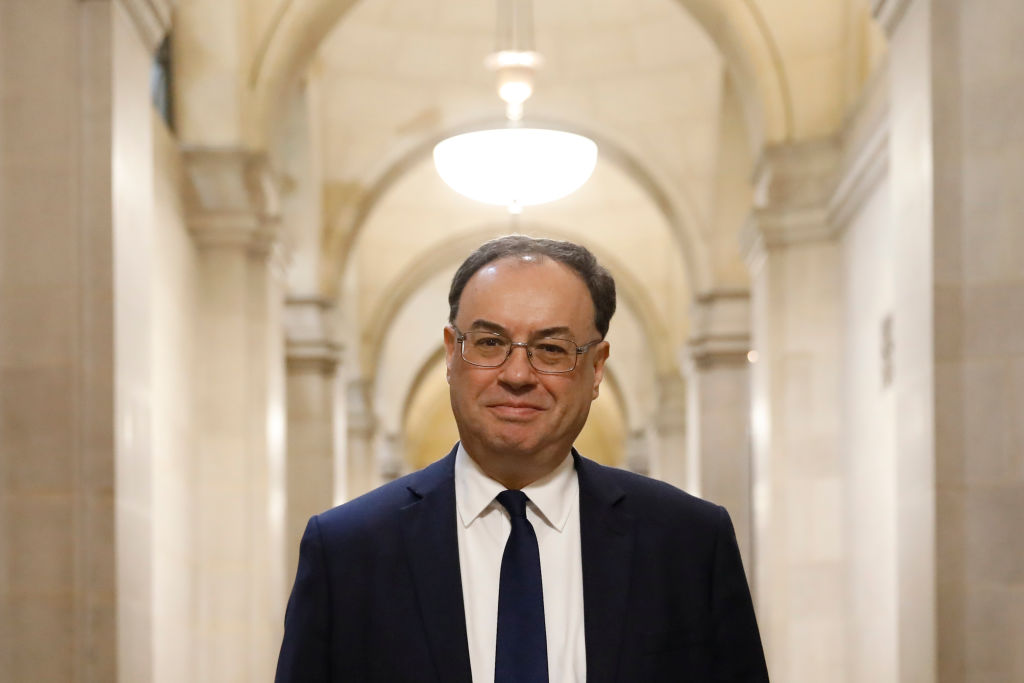Coronavirus is the ‘black swan’ event of our times, casting a long shadow over global economies. It poses many economic threats: to consumers’ direct spending, the liquidity of businesses and to confidence. And it’s likely to take years to recover from. A wartime mindset, and unprecedented fiscal action are essential tools for limiting the damage. But while the Bank of England is experienced in responding to such disruptive scenarios, its new governor, Andrew Bailey, is just days into the job and under enormous strain. Is he up to the task?
Bailey is no stranger to a credit crunch, having worked on the Northern Rock bailout and been RBS chief cashier when they ran out of money. Traditionally at Threadneedle Street, the Governor focuses on monetary policy but preventing systemic banking failure has recently become a more pressing priority. As a result, the demands on Bailey’s skillset will be greater than the typical requirements of his predecessors.
But while the current crisis is unprecedented, there are reasons to be optimistic that Bailey is the right person for the job. Bailey is an excellent communicator, fluent in persuasion, and in possession of large reserves of composure, like his predecessor. All these qualities will be much needed amid the chaos and confusion of the coronavirus crunch.
Along with other central banks, Bailey has cut interest rates, an option not open to Christine Lagarde at the ECB. He also skilfully used other monetary tools to sustain the credit channel and boost liquidity, including loan guarantees and helping pressured companies bridge through disruption to their cash flows.
Bailey has also embarked on £200bn of quantitative easing, at a time when the major banks are well capitalised, more stringently regulated and in a stronger position to help business and households navigate the coronavirus crisis, more so than in 2008/09 when the banking system itself was in danger of collapse. This comparatively strong position means that more QE may be unnecessary when economic activity is so severely depressed, and when loan reliefs and holidays for mortgages and business rates could be more powerful.
In fiscal terms, Keynesian pump-priming is back in fashion as the US and UK can borrow at historically low interest rates, or even negative interest rates if you are in Japan or Germany. There is a solid rationale for borrowing and using public spending to temporarily replace reduced activity in the private sector.
Rishi Sunak has taken many of the valuable microeconomic measures available to him: delaying tax receipts, wage subsidies and increased benefit payments to those suffering economic loss. Temporary tax cuts may also be needed.
Yet while Covid’s economic impact could be severe, it needn’t be permanent. Once the crisis passes the peak and confidence is restored, a relatively rapid recovery is possible, regaining growth at the rate it would have been. This is provided the right measures continue to be taken and taken swiftly. And so far Bailey seems to be delivering.
The post-financial crash recovery was anaemic and drawn out, given balance sheets were rebuilt through reduced borrowing and higher savings over several years. Today’s balance sheets are generally in better shape.
As the ‘first-mover’ in the crisis, the Chinese economy will have contracted sharply, but some restrictions are now easing with factories reopening and travel increasing. Nothing is certain, but it may suggest a reasonably short, sharp economic shock preceding a possible recovery. PMI data from China which was published yesterday certainly suggests as much: the country’ manufacturing bounced back very strongly in March, with PMI up to 52 in March, rising from an all-time low 35.7 in January and February.
Bailey inherits one of the most challenging scenarios in the long history of the Bank – his goal is to help prevent an unavoidable contraction from becoming a protracted recession, or even a depression with rocketing and persistent unemployment.
So far, he has acted powerfully and quickly, steadying the markets successfully, when they initially struggled to price the uncertain impact of Covid, and the stimulus response. Greater intervention is required by government on coronavirus than in 2008 – it must be responded to like a natural disaster. If Sunak and Bailey’s prescribed medicine and dosage is correct, then it could be only a one-off hit to the economy, and a more affordable intervention given the lower interest rates, and more justifiable given the smaller economy twelve years ago.
At the height of the financial crisis, Gordon Brown staked his claim to be the only man to steer Britain through the times, saying: ‘This is no time for a novice.’
In the same way, Bailey is the right man for this serious moment: statesmanlike and unassuming, inspiring confidence, and having the equanimity, foresight and presence of mind to steer the country through the maelstrom to calmer waters.
Beyond Covid, we will need Bailey’s agile, astute leadership in building a resilient financial system and dynamic real economy as nations pick up the pieces from the havoc the coronavirus has wrought in our increasingly globalised world.
Stephen Lynch is a former press adviser to the Conservative Party, and to Sajid Javid’s leadership campaign






Comments